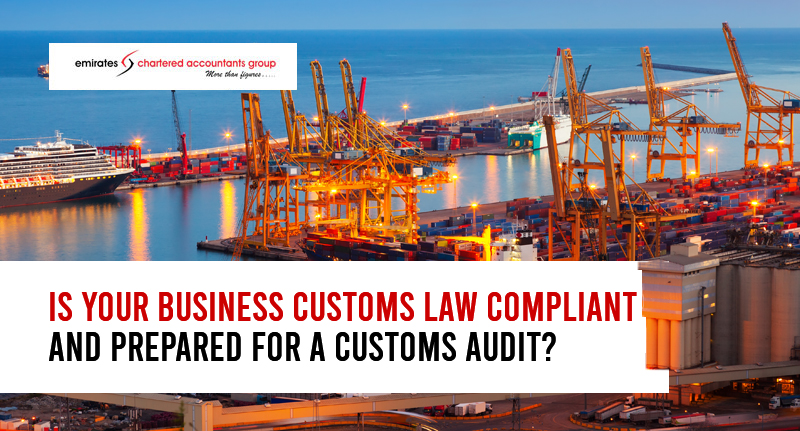
- May 16,2021
- UAE VAT
Customs Duty in the UAE
Goods imported into a country are subject to customs tax or Customs Duty specified in the Customs tariff and are collected at the first point of entry. The customs duty rates on imported goods are fixed at Ad Valorem Terms, i.e the customs duty is calculated on a percentage of the CIF value of the goods or on a Specific term wherein the import duty is calculated on a quantitative description of the goods.
The customs duty in UAE on foreign goods originated and imported from non-GCC countries are:
- 5% on CIF value
- Ad valorem or specific duty of 100% on value or quantity/ weight, whichever is higher on tobacco and related products
- 50% on Alcohol Products
The customs duty is applicable for all goods and commodities being imported with duty exemption in UAE for Diplomatic goods, Military goods, Personal and household goods, Passenger goods, Philanthropic and Charitable goods, commodities used by people with special needs, and returned goods meeting certain criteria.
Industrial license holders can avail exemption for the raw materials and machinery being imported for manufacturing purposes, with prior approval from Customs Department.
A detailed customs declaration needs to be submitted by the Importer / Exporter, Authorized Representative, or Customs Broker for the clearance of goods in UAE, whether exempted or not.
The customs duty is levied according to the contents of the declaration filed and supporting documents are required to be submitted within 14 days of the filing of the declaration.
Customs Audit -Prepare your business for customs audit in UAE
What are the different types of declarations available to an applicant?
The following regime type of declaration needs to be specified by the declarant while filing the declaration:
1.Import – Import to Local / Customs Warehouse(CW) from Rest Of World (ROW) / Free Zone (FZ) / CW/ GCC, Import for Re-export to Local from ROW / FZ / CW and Import after Temporary Admission.
2.Export – Export from Local / CW to ROW / Dubai FZ / GCC, Re-Export to ROW / FZ, Temporary Export and Return after Temporary Admission
3.Transit – FZ Transit In, FZ Transit Out, FZ transit between Dubai FZs and FZ Transit In from GCC / Other Emirate FZ
4.Temporary Admission – Temporary Admission from ROW / FZ / CW to Local
5.Transfer – Transfer within an FZ and Transfer of cargo by Dubai based CW
The customs duty in UAE can be suspended when goods are:
- In transit
- Stored in Customs Warehouse
- Admitted into Freezone and/or Duty-Free shops
- Under temporary admission
- Imported for re-exportation
The customs duty on goods being moved from one place to another can be suspended on depositing a guarantee equivalent to the amount of import duty suspended.
‘Makasa’ procedure
If the goods first arrive at the Dubai Port and move to a GCC State, all customs procedures will be conducted at the first point of entry.
The import duty paid goods may cross the borders of GCC states without being charged customs duty at each point of entry by availing the service of Automated Transfer of Customs Duty (ATCD) or ‘Makasa’ procedure, wherein a 65-digit code will be generated on the Statistical Declaration avoiding duplication of duty payment at the destination port.
Customs department post-clearance audits
The customs department conducts post-clearance audits on all transactions to ensure compliance of Law. This audit can be initiated by the Customs Department at any point in time and for any period. In this process, the Department will request the entity to provide inventory details for the audit period desired.
This information will be compared with the Customs Declarations filed by the entity and if it results in discrepancies in terms of quantity, weight, or value, the entity will have to provide reconciliation, accompanied with supporting documents, to substantiate the difference.
Failure to justify the discrepancy would result in considering the different quantity as ‘smuggled’ and levy of penalty and fine, in addition to the applicable customs duty.
Some of the ways in which an entity can ensure reconciled customs records are:
- Implementing system controls to ensure the export price is not less than the import price.
- The weight of goods exported is equal to the import weight (except manufacturing), especially in cases where the import would be in cartons and export in loose packs.
- Each export document mentions the corresponding import reference number.
- Each line item of the GRN mentions the HS Code, Country of Origin, Weight, and Quantity of the goods
- The details of Fixed assets imported are also maintained like other goods. In case fixed assets are created from the imported material, the inventory record for those fixed assets also needs to be maintained.
- Proper approval and certificates are obtained during the disposal of damaged goods.
- Documenting all declarations and supporting records of each export along with corresponding import declaration – especially in the case of Free zone companies selling to Mainland companies
Apart from the target audit initiated by the Department, an entity can also submit a request to have their records audited by the Customs Department on payment of a Service Fee. Conducting regular audits will ensure that the company records match with Customs records, and this would save the entity from fines and penalties.
The discrepancy of records attribute to the act of ‘smuggling’ by the Dubai Customs Authority and results in penalties and fines. Hence, entities are required to ensure that declarations are accurately and timely submitted, records are properly maintained, computerized inventory system maintained, and regulatory requirements by the Customs Authority are complied.
Entities are recommended to seek expert advice and support to ensure compliance with the Laws and regulations and best practices.
For Support on Customs Tax:
Pradeep Sai, Partner
M:+971556530001
E:sai@emiratesca.com





